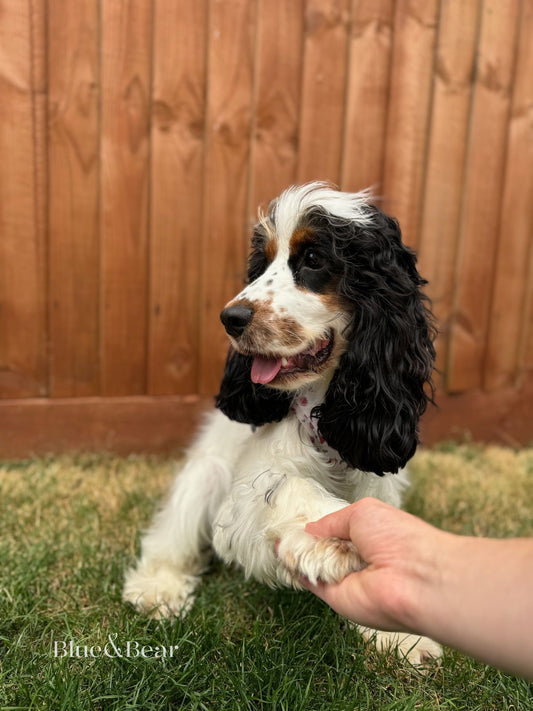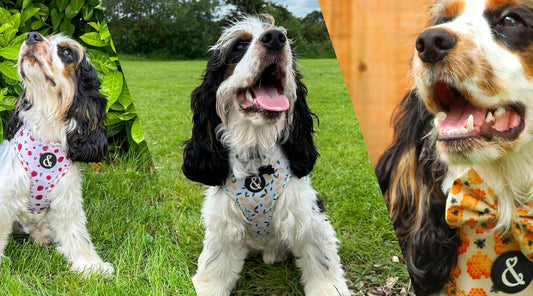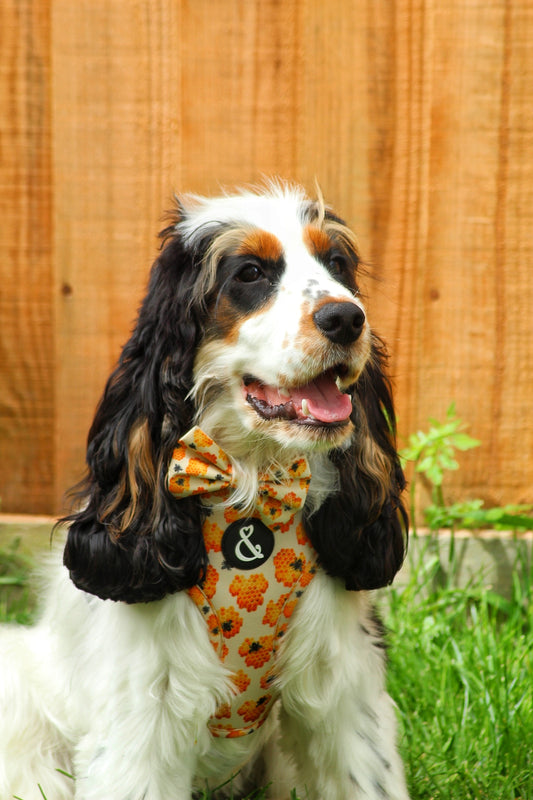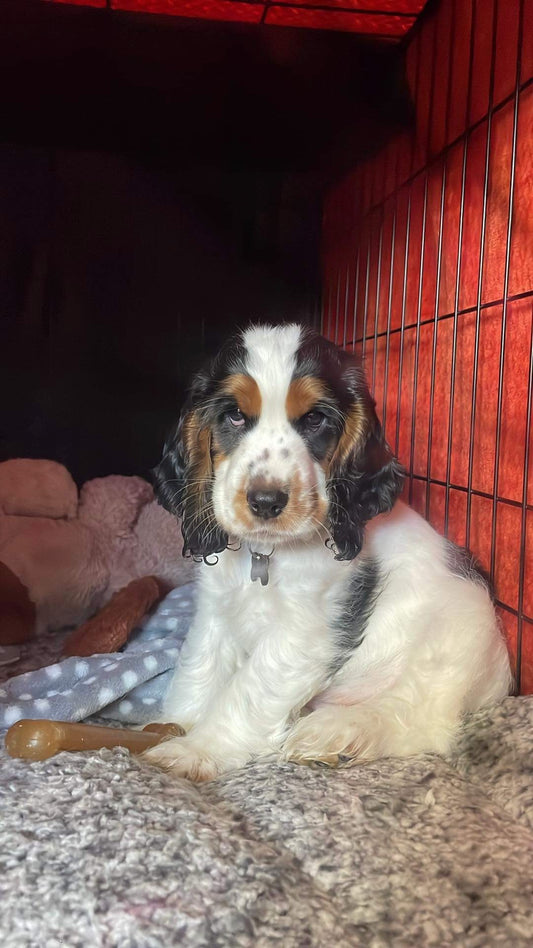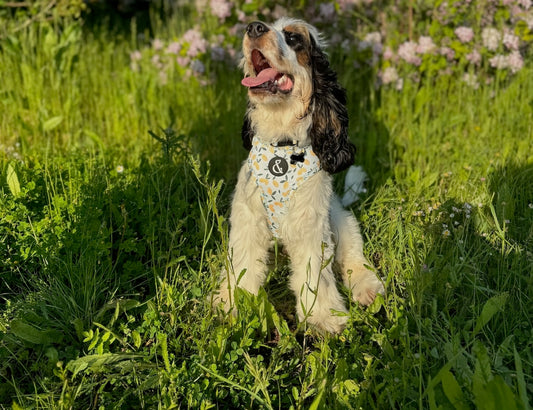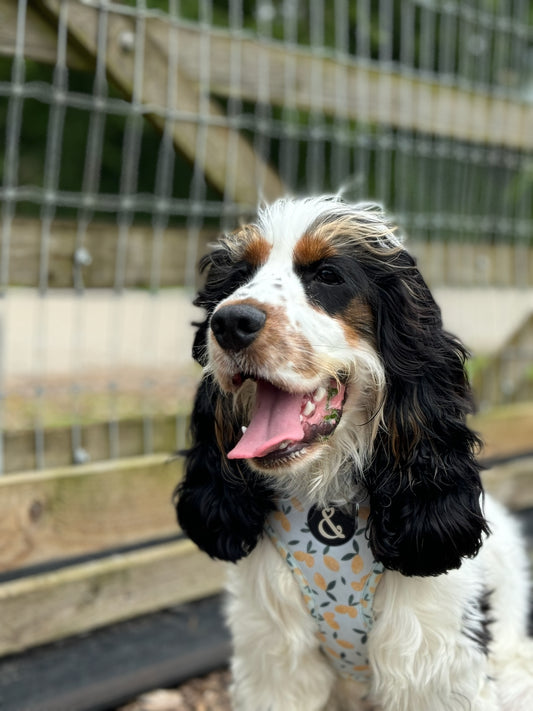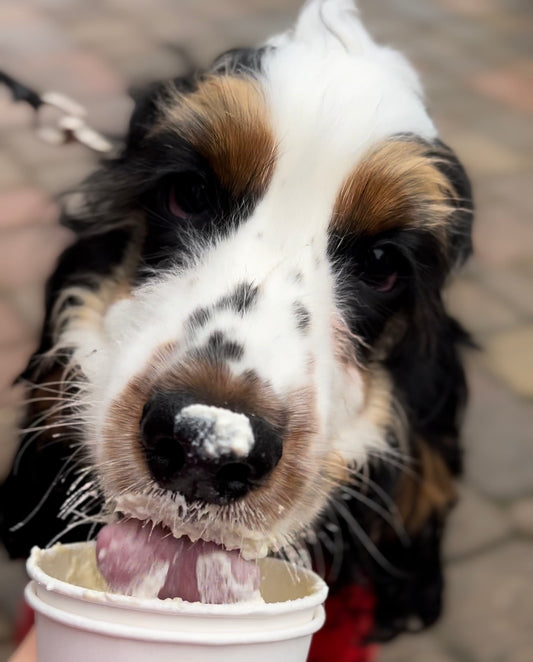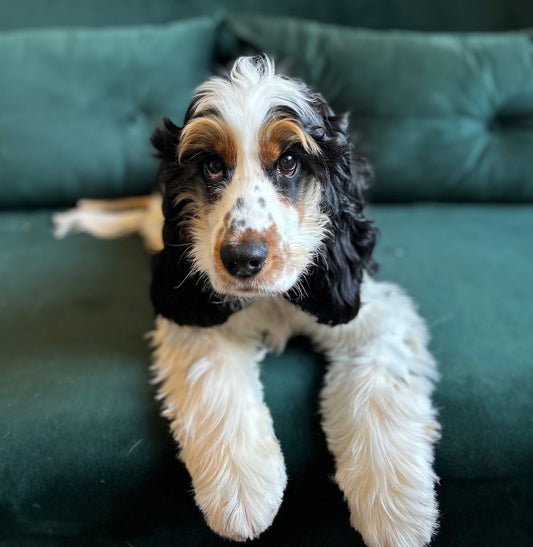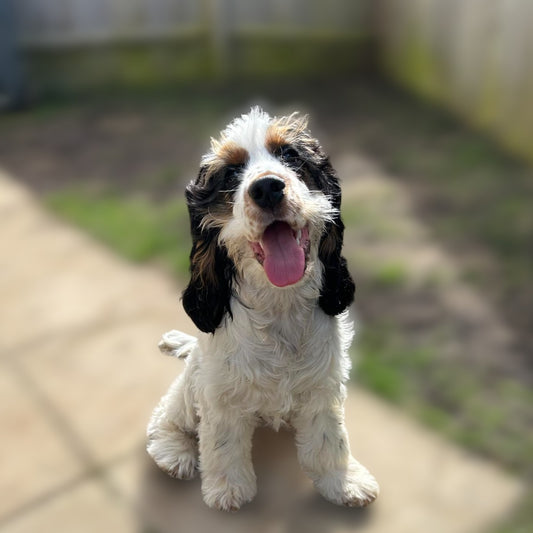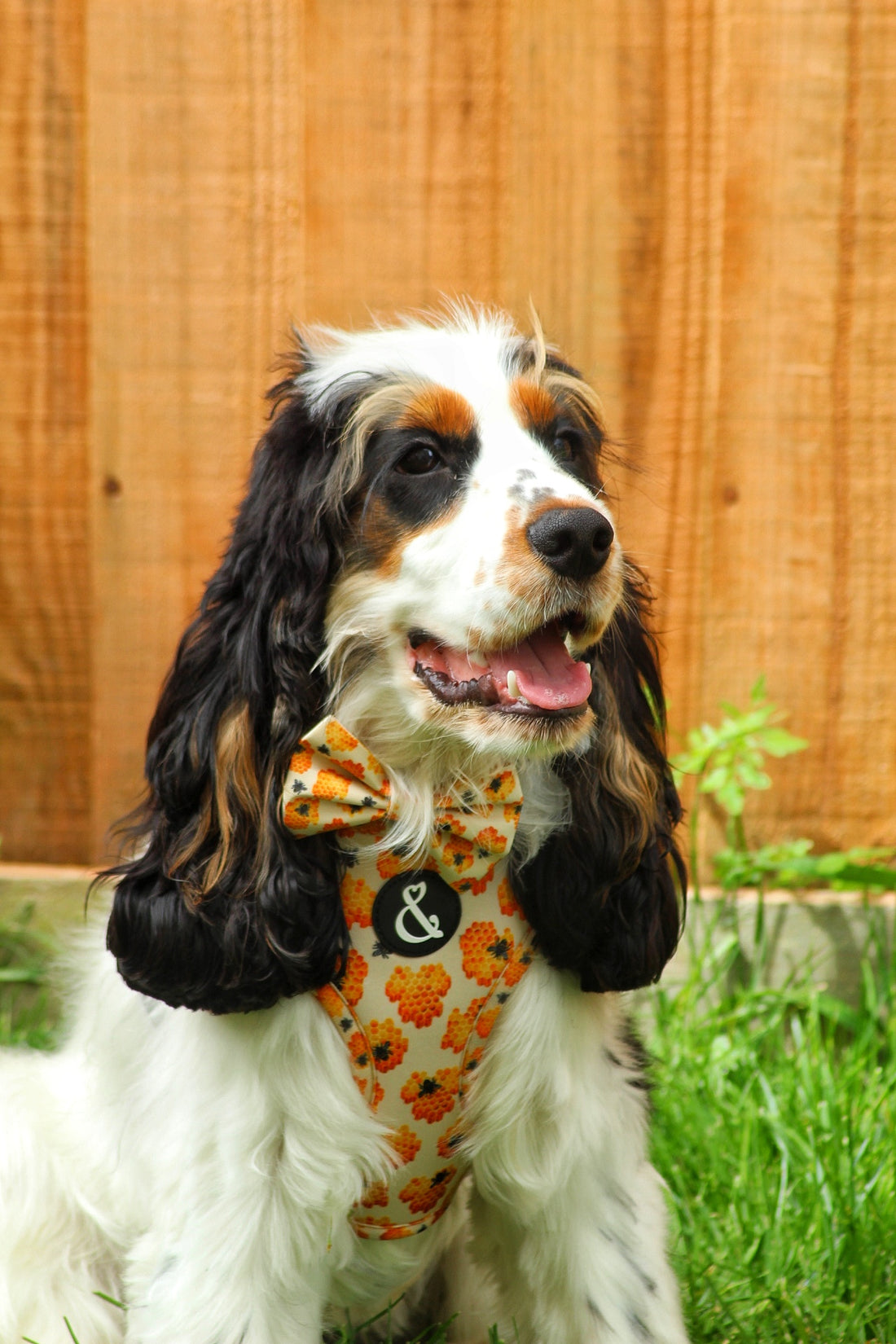
How to Measure Your Dog for a Collar
Finding the right collar for your dog is more than just picking a stylish design! The collar you pick also needs to fit properly to ensure your dog's safety and comfort, This guide will walk you through the steps of measuring your dog's neck accurately, so you can choose the perfect Blue & Bear dog collar for your pup!
Key Takeaways
-
Always measure your dog's neck where the collar will naturally sit.
-
Use a fabric tape measure or a piece of string to get an accurate measurement.
-
Add extra space to the measurement to ensure the collar is not too tight.
-
Check the fit regularly, especially if your dog is growing or gaining weight.
-
Make adjustments as needed to keep your dog comfortable and safe.
Choosing the Right Dog Collar
Choosing the right collar for your dog is crucial for their comfort and safety. Whether you’re picking a collar for the first time or checking the fit of an existing one, it’s important to get it right. We're going to focus on our flat dog collars range, as these are the most common type of collar, and are great for everyday use!
Collar Materials to Consider
You should make sure that the collar you're purchasing is made from a strong set of materials, ensuring that they're fade resistant, whilst staying secure. Our range of collars are designed to keep their fabric retains its vibrant colours, and stays sturdy for a longer duration, making them perfect for adventurous dogs who get muddy quickly, or laid back dogs who prefer to chill in the sun!
Collar Safety Features
When choosing a collar, safety should be a top priority. Look for collars with quick-release buckles, such as our range of collars to help remove a collar quickly if necessary.
Tools You'll Need to Measure Your Dog's Neck
When it comes to measuring your dog's neck, having the right tools makes it a much simpler process. You don’t need fancy equipment; just a few everyday items will do the trick!
-
Fabric Tape Measure: This is the best option for getting an accurate measurement. It’s flexible and can easily wrap around your dog’s neck.
-
Piece of String: If you don’t have a tape measure, a piece of string can work just as well. Just remember to measure the string against a ruler later!
-
Ruler: If you used string, you’ll need a ruler to measure the length of the string after wrapping it around your dog’s neck.
Remember, measuring your dog’s neck accurately is key to finding a collar that fits well and keeps them comfortable!

Step-by-Step Guide to Measuring Your Dog's Neck
- Getting Your Dog Ready: First, get your dog to sit calmly in front of you. It's best if they face away from you. This way, you can easily reach around their neck. If you need a guide on how to teach your dog or puppy to sit, we have one!
- Positioning the Tape Measure: Wrap a fabric tape measure around the base of your dog's neck, where the collar usually sits. Make sure it's snug but not tight. Place two fingers between the tape and their neck to ensure it's not too tight.
- Adding Extra Space for Comfort: After measuring, add one to two inches to the measurement. This extra space ensures the collar will be comfortable. Record this measurement using a pencil and paper and mark it down as their neck measurement.
Common Mistakes to Avoid When Measuring
- Measuring Too Tightly: One of the most frequent errors is measuring your dog's neck too tightly. This can make the collar uncomfortable and even harmful. Always ensure you can slip two fingers between the tape measure and your dog's neck to avoid this mistake.
- Forgetting to Add Extra Space: Another common mistake is not adding extra space for comfort. This extra space ensures that the collar isn't too tight and allows for some movement. Mistakes happen so make sure you buy your collar from a reputable shop with a good returns policy. We offer a 30 day return policy, so if you purchase a collar from us, just let us know if it's not the right size!
- Using the Wrong Tools: Using the wrong tools can lead to inaccurate measurements. Avoid using rigid tools like rulers. Instead, use a fabric tape measure or a piece of string to get a more accurate measurement.

Adjusting the Collar for the Perfect Fit
Getting the collar just right can make or break your perfect fit! Once you’ve measured your dog’s neck, it’s time to put that collar on and see how it fits. Here are some tips to ensure it’s snug but not too tight:
-
Check the Fit: After putting the collar on, you should be able to fit two fingers comfortably between the collar and your dog’s neck. If you can’t, it’s too tight. If you can fit more than two fingers, it’s too loose.
-
Making Adjustments: Most collars come with adjustable straps. If it’s too tight, loosen it a bit. If it’s too loose, tighten it up until you get that perfect fit. Remember, the collar should sit comfortably where it naturally rests on your dog’s neck.
-
Ensuring Comfort and Safety: Keep an eye on your dog after adjusting the collar. If they seem uncomfortable or are scratching at it, it might need further adjustment. A well-fitted collar should allow your dog to move freely without any irritation.
Remember, a collar that fits well is not just about comfort; it’s also about safety. A loose collar can slip off, while a tight one can cause injury, so take your time to adjust it properly.
What Is the Most Common Dog Collar Size?
Collar sizes typically range from extra small through to extra large. The most common collar size for your dog is primarily determined by the dog's breed, which directly influences their neck circumference and overall body proportions.
When to Re-Measure Your Dog's Neck
It's important that as a dog owner, you regularly assess your dog's collar fit, especially during the growth stages. A properly fitted collar should allow for two fingers to fit comfortably between the collar and the dog's neck, ensuring both security and comfort. Here are some key times to re-measure:
- Growth Spurts in Puppies: Puppies grow quickly, and their neck size can change in just a few weeks. Measure their neck every couple of months to make sure their collar isn't too tight. We offer a puppy size up offer at Blue & Bear! If your puppy has outgrown their existing Blue & Bear collar, let us know and we'll provide you a 50% discount on the next size up!
- Weight Changes: If your dog gains or loses weight, their neck size will change too. Re-measure their neck if you notice any significant weight changes to keep their collar fitting well. If the weight of your dog has increased or decreased rapidly, it may be best to check with a local vet.
- Signs of Discomfort: If your dog seems uncomfortable or is scratching at their collar, it might be time to re-measure. Place two fingers between the measuring tape and their neck to ensure the collar isn't too tight or too loose.
Conclusion
Measuring your dog's neck for a collar might seem like a small task, but it's super important for their comfort and safety. Remember, a well-fitted collar shouldn't be too tight or too loose. Use a soft tape measure, add a couple of fingers for comfort, and you'll get it just right. With these simple steps, you can make sure your furry friend is both stylish and comfy in their new collar!
Frequently Asked Questions
What size collars do you provide?
We provide dog collars in sizes of extra small, and small, and all our dog accessories are primarily targeted towards smaller dog breeds, such as Cocker Spaniels, Cockapoos, and Shih Tzu's.
What collars do you currently stock?
Our latest stock includes a blue dog collar with lemon pattern, a yellow bumble bee dog collar with honey, and a pink dog collar with a strawberry pattern!
How do I measure my dog's neck for a collar?
To measure your dog's neck, use a fabric tape measure. Place it around the base of your dog's neck where the collar would sit. Ensure it's snug but not tight. You should be able to slip two fingers between the tape and your dog's neck for comfort.
What if I don't have a fabric tape measure?
If you don't have a fabric tape measure, you can use a piece of string. Wrap the string around your dog's neck, mark the length, and then measure the string with a ruler.
How much extra space should I add to the measurement?
Add about two inches to your dog's neck measurement. This ensures the collar is not too tight and provides enough room for comfort and safety.
When should I re-measure my dog's neck?
You should re-measure your dog's neck during growth spurts, if there are significant weight changes, or if you notice signs of discomfort like scratching or restlessness.
What are common mistakes to avoid when measuring?
Avoid measuring too tightly, forgetting to add extra space, and using the wrong tools. Always ensure the tape is snug but not tight and add two inches for comfort.
How do I adjust the collar for the perfect fit?
Once you have the right measurement, put the collar on your dog and ensure you can fit two fingers between the collar and your dog's neck. Adjust the collar as needed to ensure it's snug but not too tight.

